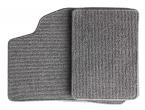Using neither. Neither and Nor rules, examples with translations, exercise. Neither and Nor with singular and plural nouns
Many grammatical topics require more detailed consideration, since gaps in knowledge significantly complicate not only the process of transmitting information in the target language, but also understanding the speech of native speakers.
General information
One of the important themes is the words either, neither. The use of these lexical units has certain features, since in different cases they can act as an adverb, pronoun or conjunction. They are also used in various designs.
Regarding the pronunciation of neither/either, the phonetic rule allows for two variations. The difference is due only to the peculiarities of the dialects. The stress falls on the first syllable.
- In the UK they mostly speak , .
- In the United States and some northern parts of England, the variant is common.
Features of the use of different variants of translation "too" and "also"
The most common translations of the words "too", "also" are the English equivalents too, also. However, there are constructions in which the use of these words would be a mistake.
How do you translate the Russian phrase "me too"? It all depends on the answer to which statement this expression will be. If the interlocutor's offer was in the affirmative, to which you want to answer "me too", then use too. If you want to say "me too" in response to a negative statement, then you should use the phrase me neither. In the case when you answer the phrase of the interlocutor and use the particle not, should be put either.
Consider the following examples:
- I like juice. - Me too. (I like juice. - Me too.)
- I don't like juice. - Me neither. (I don't like juice. - Me too.)
- I don't like tea. - I don't like tea either. (I don't like tea. - I don't like tea either). Or neither do I. (I don't like either.)
The first two cases are quite easy to understand. If the phrase "me too" is a response to an affirmative statement by the interlocutor, you use the phrase me too. If you agree with the negative proposal, then answer me neither. The third case involves the combination of a particle not and adverbs either in one sentence.
Neither/either: rule of constructions "either... or...", "neither... nor..."
In such expressions, the above words act as conjunctions. The equivalent of the Russian construction "either... or..." is the English formula either... or. That is, the first "or" is translated as either, and the second - as or. This expression is used when it comes to choosing between two units, but only one can be chosen.
Examples:
- Either you make an apology now or I "ll tell your mother. - Either you apologize now, or I will tell your mother.
- They want to go either to Argentina or to Venezuela for winter holidays. - For the winter holidays, they want to go either to Argentina or to Venezuela.
When it is necessary to translate a sentence containing the words "neither ... nor", the English construction neither ... nor is used.
Examples:
- Neither Mary nor Ann brought this book. Neither Maria nor Anna brought this book.
- You can have n either ice cream n or cake before the dinner. - You can't eat ice cream or cake before dinner.

Note
It is important to remember that, unlike the Russian formula, where in addition to "neither" the particle "not" is also used (He not is eating neither fish, neither meat), in the English version the negative particle is omitted: He _ eats neither fish nor meat. In such cases, do not use not along with the established structure. The English formula already assumes that the sentence is negative. This is one of the most common beginner mistakes.
"any" and "none"
The translation of the Russian word "any" depends on the context. It is easier to understand this nuance with specific examples:
- Which book can I read? - You can take any of them. (What book can I read? - You can take any of them.)
This example illustrates the case when there are several options (more than two). If it is necessary to choose one of the two, the answer will be as follows:
- You can read either(one/of them). - You can read any (of the two). Or neither, which means "none" (out of two).
Note: in those cases where you need to use the word "both", use both. For instance:
- I like both books. - I like both books.
Compare with the following examples:
- I like neither books. I don't like any (of the two) books.
- I can read either book. - I can read any of the (two) books.
- I can read any book. - I can read any book (generally).
Either, neither: use in other phrases
For almost every word, you can find a certain set of set expressions that you need to know. This will make your speech more colorful and expressive.
- ~ way - no matter how / there;
- from ~ direction - from any direction;
- in ~ case/event - in any/in this or that case;
- on ~ hand/side - on both sides;
- give a month or so ~ way - with a possible deviation of a month in one direction or another.

Neither:
- I am ~ off nor on - I can't decide, I hesitate;
- ~ fish nor flesh - neither fish nor meat;
- ~ here nor there - inopportunely, does not play a special role, it does not matter;
- ~ more nor less than - only, only, nothing else;
- ~ way - neither this nor that, neither this nor that;
- on ~ side - on neither side.
Try to enrich your active vocabulary with additional expressions, gradually memorizing new phrases.
Exercises with answers
To successfully master any topic, whether it be grammar rules or a set of vocabulary, you should apply new material in practice. In addition to making sentences, it is also useful to complete assignments. If you work through enough either/neither word substitution exercises, sentences will become much easier. You will be able to use them freely in your daily speech with native English speakers. Any knowledge should be immediately applied, otherwise it is forgotten.
Insert missing words either/neither. The exercise:
- She can "t ride a horse. - I can" t ride them ... (She can't ride a horse. - I can't ride them either.)
- I "ve never been to China. - Me ... (I've never been to China. - Me too.)
- I can "t understand that language. - I can" t understand it ... (I can't understand this language. - Me too.)
- I speak ... French or Spanish. (I don't speak French or Spanish.)
- You can go ... to Japan or Vietnam. (You can either go to Japan or Vietnam.)
- Ann won "t go to school tomorrow. - Her brother won" t go there ... (Ana doesn't go to school tomorrow. Her brother doesn't go either.)
- Which pencil can I take? - ... of them. (What kind of pencil can I take? - None of them.)
Answers:
1, 3, 5, 6 - either;
2, 4, 7 - neither.

It is important to carefully consider the context, using this or that vocabulary when translating, including either/neither. The use of some words in English has its own characteristics, unusual for Russian.
Use of the wordeither
The word "either" in English has many meanings. Consider the most common options.
If “either” comes before a singular noun, then it takes on the meaning of “both”.
E.g. You can do it on Thursday or Friday, either day will be ok.
You can do it Thursday or Friday, whatever both that and the other day.
The meaning of "both the one and the other" either has and if it is followed by of + a noun. with a defining word (my, the, these, etc.) in the plural. h.
E.g. Either of the books is a quite good choice for reading.
Both that and the other book , is a good enough reading choice.(Fig. 1)
Rice. 1. Illustration for example ()
The same construction can be translated as "one / any of the two":
E.g. They could work with either of them.
They could work with any of the two.
We didn't watch either of those matches.
We didn't look none of those (two) matches.
We usually use "also" or "as well" to indicate similarity in terms of action.
E.g. I can ride a bike well.
I can ride a bike too.(Fig. 2)

Rice. 2. Illustration for example ()
However, when we need to say that, for example, we also DO NOT know how to ride a bike, we must say “I can’t ride a bike either”. This is a rule that should not be forgotten.
Designeither…or
Let's start with the either…or construct.
The union either…or is translated as “or…or” and is used when it comes to choosing between two different things, but you can only choose one thing. This union is used in affirmative sentences and connects any homogeneous members of the sentence.
Either ... or can connect two subjects in the singular, and then the verb will also be used in singular. h.
E.g. EitherAnnorKateis now playing the piano.
Either Anna or Katya is playing the piano now.
E.g. Eitherour classmates orour teachers were in the cinema yesterday.
Either our classmates or our teachers were at the cinema yesterday.
E.g. Eitherthe children, oryour guest hascomplained to our parents.
Either the kids or your guest complained to our parents. (Fig. 3)
There areeithe ra pencil orpens on the table.
Either a pencil or pens are on the table.
1 . The union either…or can connect predicates.
E.g. You can eitherhelp us orgo to your room.
You can either help us or go to your room.

Rice. 3. Illustration for example ()
2 . Also, this union can combine homogeneous definitions.
E.g. You can take eitherblueorred paper clips.
You can take either blue or red paperclips.
3. Homogeneous additions can also be combined with the union either ... or.
E.g. We should bring eithercoffeeortea.
We need to bring either coffee or tea.
4. And homogeneous circumstances united by this union.
E.g. She'll come eitheron Mondayoron Tuesday.
She will arrive either Monday or Tuesday.
If the sentence is negative, then the conjunction either…or can perform the function of the conjunction neither…nor, that is, it is translated as “neither… nor”.
E.g. We did not paint eitherceilingorwall.
We didn't paint the ceiling or the wall. (Fig. 4)

Rice. 4. Illustration for example ()
Designneither…nor
Now let's look at the aforementioned union neither ... nor.
This construction is negative, it is translated, as we said, "neither ... nor" and is used when it comes to any impossible things. Note that after neither…nor the verb is in the positive form, since only one negation is possible in an English sentence, and actually neither…nor performs this function.
Like the conjunction either…or, the conjunction neither…nor can connect any homogeneous members of the sentence: subjects, predicates, definitions, additions, circumstances.
Let's look at this with specific examples.
Like the union either ... or, neither ... nor can connect two subjects in the singular, and then the verb will also be used in singular. h.
E.g. NeitherPeter NorBill knows this man.
Neither Peter nor Bill know this man.
If both subjects are in the plural, then the predicate will also be used in the plural. h.
E.g. Neithermy friends normy parents knew where I was last week.
Neither my friends nor my parents knew where I was last week.
If one subject is used in the singular and the other in the plural, then the predicate will correspond to the nearest of them.
E.g. Neitherher beautiful clothes norher expensive smart phonehasimpressed him.
Neither her beautiful clothes nor her expensive smartphone impressed him.
And here is how the union neither nor can combine homogeneous predicates, definitions, additions and circumstances.
E.g. I will neithergo to the cinema norstay at home.
I won't go to the cinema, but I won't stay at home either.
He likes neitherFrenchnorGerman artists.
He does not like either French or German artists.
She likes neitherstrawberriesnorcherry.
She doesn't like strawberries or cherries.
I met Tom neitherin the streetnorat school.
I met Tom neither on the street nor at school.
Appeals in English
In English, there are many variants of polite forms of addressing a person. In relation to a man, the forms Mr., Sir are most often used, and in relation to a woman - Mrs., Miss, Madam. Now let's look at each of them separately.
Form (mister) can be used when referring to a man, regardless of his age and marital status. The main thing is that it should be followed by the name of the person being addressed:
Dear Mr. Ivanov, welcome to our Club!
Dear Mr. Ivanov, Welcome to our club! (Fig. 5)

Rice. 5. Illustration for example ()
If the name of the person we are addressing is unknown, then Sir is used:
Sir, could you repeat the task, please?
Mister, Could you repeat the task, please?
This is how schoolchildren address the teacher, sellers address buyers, waitresses address restaurant customers.
Form (mistress) is used when referring to a married woman, regardless of her age, and should be followed by a surname:
Mrs. Smith, come to us, please!
Mrs Smith come to us, please!
The Miss form is used for an unmarried woman and must be followed by a surname:
Dear Miss Willis, we are so glad to see you!
Dear Miss Willis we are so glad to see you!
Madam is the most formal address for a woman. It is used when the woman's last name is unknown to us:
Dear madam!
Dear mistress!
Berries in English
Berries are a favorite treat for many children and adults. Here are examples of the English names of the most popular berries. (Fig. 7)
watermelon - watermelon
Cherry - cherry
blackberry - blackberry
strawberry - wildstrawberries
viburnum - snowball
Strawberry - strawberries
cranberry - cranberry
gooseberry - gooseberry
raspberries - raspberries
Red currants - redcurrent
black currant - blackcurrent
cherries - sweetcherry
blueberry - bilberry
rose hip - hip

Rice. 7. Illustration for words ()
Tasks for self-test
And now let's do some exercises to the use of either…or and neither…nor better.
Now let's do some exercises to better understand the rules for using the either…or and neither…nor constructions.
The first task. Look at the sentences and fill the gaps with either…or neither…nor.
1. I didn't like the new book. It was ___ interesting ___ useful. → neithernor
2. Granny promised me a nice dessert. It will be ___ a chocolate cake ___ an apple pie. → eitheror
3. No, thank you. I'll have ___ tea ___ coffee. → neither nor
4. Alex will phone me ___ at five o'clock ___ at six o'clock. → either or
5. I can bring you ___ green ___ yellow glasses. → either or
The second task. Complete the sentences with the correct form of the verb.
1. Neither my friend nor I like/likes music. → like
2. Either Kate or Ann was/were watching this film last night. → was
3. Either my father or my grandparents is/are at home now. → are
4. Neither my cat nor my dog have/has eaten the bread. → has
5. Neither Tom nor Jack study/studies Maths. → studies
Bibliography
- Afanasyeva O. V. Series "New English Course for Russian Schools". Grade 5 - M: Bustard, 2008.
Come up with two sentences each with either…or and neither…nor constructions.
In this lesson, we begin to get acquainted with pronouns at the level upper intermediate approaching the level advanced and we will consider pronouns both, either, neither. Of these pronouns both (both, both)- occurs quite often, and either, neither much less often. But it is necessary to consider them in a complex in order to immediately put everything in its place.
Attention! So, the most important thing is pronouns. both,either, neither refer only to TWO persons or objects. In other cases, use pronouns every,each and etc.
Pronouns Both, Either, Neither. Rules of use
1. Pronoun Both
Rule 1 Pronoun both (of) refers to TWO persons or things and is translated " both", "both", "both". Both (of) used before a plural noun.
- Both my friends live in Germany. = Both of my friends…. Both of my friends...
- We both choose Maths. = Both of us…. – Both of us… = Both of us…
- Would you rather have cheese or a hamburger? – I'd have both. I would eat both.
Remember:
both boys , both the…, both of the…, both his …, both these … but we both= both of us…
Rule 2 When both is the subject, the verb is plural. number.
EXAMPLE. Both are good. - Both are good.
Rule 3 In negative sentences instead of both the pronoun is used neither -"neither of the two."
EXAMPLE. Neither of us choose Maths. None of us chose math.
It is forbidden: Both of us didn't choose maths.
Rule 4 Common to construction: both …. and…. - “both ... and another” / “like .... So…" agrees with the verb in the plural.
EXAMPLE. Both Pete and Mary were there. Both Peter and Mary were there.
2. Pronoun Either
Rule 5 Pronoun either (of) also refers to TWO persons or objects and is used in the sense "one of two, any of two, one or the other"
- take either book. — Take one of two books (any, no matter what).
- either of these flowers will do. — And those and others flowers will do.( Any of these colors)
* * *
NOTE. Pronoun either (of) also has the meaning "each of the two, both, both" and in this sense it can be confused with the pronoun both, but in unlike both, the pronoun either agrees with the verb in in the singular!
- There were houses on either bank of the river. — On both There were houses on the banks of the river.
- There were chairs on either side of the table. — And with that, and with the other Chairs stood at the side of the table.
COMPARE
- Both my friends live in Moscow. Both my friends live in Moscow.
- either of my friends live s in Moscow. Both the one and the other are my friend lives in Moscow.
Rule 6 If the pronoun either is the subject, then the verb predicate is in singular. number.
EXAMPLE. Either is O.K. - Anyone will do.
Rule 7. Pronoun either has the meaning "too" - in a negative sentence, in contrast to too- "too" in the affirmative sentence.
- He likes dogs and doesn't like cats. He likes dogs and doesn't like cats.
- I like dogs too.- I too love dogs.
- I don't like cats either.- I also not I love cats.
3. Pronoun Neither
Rule 8 Pronoun neither is the negative form of the pronoun either and has the meaning "neither one nor the other (none of the two)."
EXAMPLE. Neither of the girls were pretty. — none of the girls weren't pretty. (meaning that there are only two girls).
Neither of them knew where the skating-rink was. None of them knew where the ice rink was. Neither child understands how dangerous playing with fire is. No child understands how dangerous it is to play with matches. Neither of these coffee vending machines is working. None of the coffee machines work.
Either and neither with a predicate
Neither of them takes care(take care) of an old aunt. Neither of them cares about the old aunt. Either of the paintings was (were) found in private collections. Each of the paintings was found in private collections. Neither of these teams deserves (deserve) to be a winner. None of these teams deserve to be the winner
Either…or and Neither…nor
My computer is very slow. It's either broken or virus-infected. My computer is very slow. It's either broken or infected with a virus. Neither Clara's mother nor her father understands her. Neither Clara's mother nor her father understands her. Pizza was neither fresh nor delicious. The pizza was neither fresh nor tasty. His name's either Richard or Robert. His name is either Richard or Robert.




